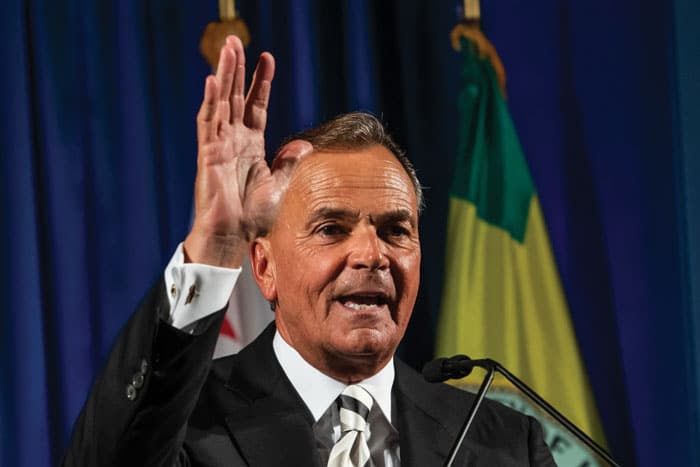 Los Angeles Mayoral Candidate Rick Caruso
Los Angeles Mayoral Candidate Rick Caruso As the dust settles after the Los Angeles mayoral primary, it’s clear that voter concerns regarding crime and homelessness have fundamentally remade the campaign. But as much fun as armchair punditry and prognosticating can be, we won’t know exactly how the race for mayor has been impacted for several months. Until then, we will watch Rick Caruso and Karen Bass attempt to navigate between two seemingly contradictory sets of demands from LA voters.
There’s a certain number of Angelenos who just want our streets to be safe and clean again, no matter what it takes, and law enforcement excess and human rights violations are an acceptable price to pay to restore some semblance of order. There’s another group who resist any significant effort to confront either challenge and instead prioritize sweeping police reform and the preservation of existing homeless encampments even if such steps continue to threaten public safety.
Neither of these factions is large enough to elect a mayor, which leaves Bass and Caruso to search for an elusive and amorphous middle ground that can satisfy the majority of voters who are desperate for both safety and compassion. The challenge for both candidates is how to balance those two imperatives: the one who figures it out will be the next mayor.
Neither Caruso or Bass is embracing either of the extremes outlined above. The sentiments that drove the protests after the tragic deaths of George Floyd and Breonna Taylor have largely cooled and most mainstream Democrats (including Bass) are working hard to distance themselves from the “defund the police” rhetoric that was so prevalent at that time. And while Caruso has outlined a much more aggressive approach than is currently being used in Los Angeles and most other large cities, his strategy does not represent a return to the Three Strikes era of the late 20th century.
Caruso’s supporters want to be safe, but they still want to be compassionate. Bass’s voters want to be compassionate, but they still want to be safe.
While it’s the goal of most campaigns to draw the starkest contrasts against their opponent, this particular election looks to be a matter of shades of gray. Caruso’s supporters want to be safe, but they still want to be compassionate. Bass’s voters want to be compassionate, but they still want to be safe. The difference between them will be largely one of emphasis.
But this debate does represent a decided shift to the right from the way criminal justice issues have been addressed in California for many years, which plays to the benefit of a centrist outsider candidate like Caruso. But the political newcomer could also overplay his hand, and if voters decide that his policies are too doctrinaire, Bass could look like a reasonable alternative.
Such nuance rarely survives the heat of a general election battle. Already, Bass’ supporters are sending mail that morphs Caruso into Donald Trump and the Caruso team has begun to link Bass to local criminal political activity. It’s not hard to imagine how much uglier those charges will become by early November. For low-information voters, the choice will come down to picking between the less repulsive of the two cartoon caricatures that are presented to them.
But underneath the nasty back-and-forth, an important political shift is taking place. Public safety issues had slipped far down the list of voter concerns over the last twenty years, to a point where even most Republican candidates had made them less of a focus on the campaign trail. The strongest advocates of defendant rights and police reform argue that the rates for many types of crime are much lower than in the 1990’s, but voter uneasiness about crime has been steadily rising and telling voters they are wrong is rarely the linchpin of an effective political strategy.
It’s important not to overstate this shift. Neither Los Angeles or California is likely to vote for conservatives for any office in the foreseeable future. Angelenos do not support a wall at the U.S.-Mexico border or tax cuts for CEO’s. They are still quite progressive. But they are progressives who are frightened of crime and exhausted by homelessness, and they are willing to at least consider atypical saviors to rescue them.
Dan Schnur is a Professor at the University of California – Berkeley, USC and Pepperdine. Join Dan for his weekly webinar “Politics in the Time of Coronavirus” (www/lawac.org) on Tuesdays at 5 PM.





















 More news and opinions than at a Shabbat dinner, right in your inbox.
More news and opinions than at a Shabbat dinner, right in your inbox.